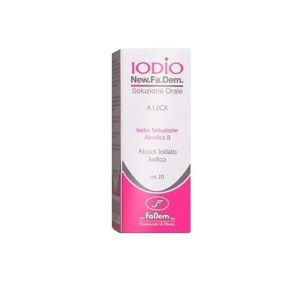Ship in Europe, Find out rates!
Iodine Alcoholic Solution new.fa.dem. Oral Solution 20ml

- box Delivery in Italy in 24/48 and free returns
- star3.000+ positive reviews
- dropboxOver 60,000 products in the catalog
Therapeutic indications
As an antiseptic and disinfectant of the oral cavity. Treatment of iodine deficiency states in case of increased need or poor absorption.
Dosage
Antiseptic and disinfectant of the oral cavity 2 - 3 daily rinses of the oral cavity with 10 - 20 drops diluted in half a glass of water. In case of canker sores or other abrasions of the oral mucosa, apply directly by touching it with a swab or cotton swab. Treatment of iodine deficiency states Take the medicine diluted in water according to the doctor's prescriptions. A drop of Iodine New.Fa.Dem. contains about 2 mg of iodine. Below are the daily iodine values recommended by the Italian Society of Human Nutrition (LARN) for age and gender.
| Children (boys and girls) | Adolescents and adults (males) | Adolescents and adults (females) | |||
| Age | LARN | Age | LARN | Age | LARN |
| 6-12 months | 50 mcg | 11–14 years | 150 mcg | 11–17 years | 150 mcg |
| 1–3 years | 70 mcg | 15–17 years | 150 mcg | 18–49 years | 150 mcg |
| 4–6 years | 90 mcg | 18–29 years | 150 mcg | More than 50 years | 150 mcg |
| 7-10 years | 120 mcg | 30–59 years | 150 mcg | Pregnancy | 150 mcg |
Overdose
Accidental ingestion or inhalation can have serious, sometimes fatal, consequences. If the recommended doses are exceeded, voluntarily or accidentally, hypothyroidism or hyperthyroidism may occur. Metallic taste, increased salivation, inflammation of the salivary glands, burning or pain of the oral cavity and throat, irritation or swelling of the eyes, rashes may also appear. , gastrointestinal disturbances with vomiting, abdominal pain and diarrhea, metabolic acidosis, hypernatremia, impaired renal function. Circulatory insufficiency and swelling of the epiglottis can also occur, which can cause asphyxia, pneumonia and pulmonary edema and can be fatal. Retinal toxicity with overdose has also been observed. Symptomatic and supportive treatment with special attention to electrolyte balance and impaired renal function is necessary. Symptomatic treatment of allergic reactions may be required, although symptoms usually subside rapidly after discontinuation of administration.
Contraindications
Hypersensitivity to the active substances or to any of the excipients. Generally contraindicated in pregnancy (see section 4.6). Do not use in children under 6 months of age. As a mouthwash it should not be used in children under 6 years of age.
Side effects
The following are the undesirable effects of iodine, organized according to the MedDRA system organ class. Insufficient data are available to establish the frequency of the individual effects listed.
| Systems and organs | Undesirable effect |
| Disorders of the blood and lymphatic system | Eosinophilia, lymphadenopathy |
| Disorders of the immune system | Hypersensitivity |
| Endocrine pathologies | Hyperthyroidism (Basedow's disease), hypothyroidism, goiter. Iodine can interfere with thyroid function tests |
| Skin and subcutaneous tissue disorders | Urticaria, angioedema, skin haemorrhage. Inhalation of iodine vapors is very irritating to the mucous membranes |
| Metabolism and nutrition disorders | Metabolic acidosis |
| Psychiatric disorders | Depression, insomnia |
| Nervous system disorders | Metallic taste, headache |
| Cardiac and vascular disorders | Hypotension, tachycardia |
| Respiratory, thoracic and mediastinal disorders | Dyspnea, pulmonary edema, bronchospasm |
| Gastrointestinal disorders | Nausea, vomiting, diarrhea, abdominal pain |
| Renal and urinary disorders | Kidney failure |
| Reproductive system and breast disorders | Impotence |
| General disorders and administration site conditions | Fever |
Pregnancy and breastfeeding
Iodine after oral absorption crosses the placenta and an excess of iodine is harmful to the fetus: iodine use during pregnancy has been associated with goiter, hypothyroidism, respiratory problems, enlarged heart, tracheal compression and neonatal death. Iodine is excreted in breast milk. The use of excessive doses of iodine in breastfeeding mothers can increase the level of iodine in breast milk and cause transient hypothyroidism in infants. The use of iodine, even when applied topically, is generally to be avoided during pregnancy and breastfeeding.
Special warnings
Avoid contact with eyes. Do not take the medicine for long periods of time. The use, especially if prolonged, can give rise to sensitization phenomena. In this case, interrupt the treatment and adopt suitable therapeutic measures. Since iodine and iodide can impair thyroid function, it is recommended to use with caution in subjects with thyroid disease, in patients over 45 years of age or with goiter. Although iodine is required for the production of thyroid hormones, excessive amounts can cause hyperthyroidism or even paradoxical goiter and hypothyroidism. In pediatric age use only in cases of real need and under medical supervision. It is advisable to avoid the use of gargle preparations in children, who almost never manage to gargle without swallowing a large part of the medicine (see section 4.3). The medicine should not be used in adolescent patients due to the potential for acne induction and effects on the thyroid gland. Discontinue treatment at least 10 days before performing a labeled iodine scan. Following treatment, the results of thyroid function tests may be altered, especially in premature babies. Important information about some of the ingredients: The product contains ethanol (alcohol), in quantities up to 100 mg per dose.
Expiry and Retention
Store at a temperature not exceeding 30 ° C. Store in the original package (iodine resistant material) to protect the medicine from direct light and heat
Active principles
100 ml of solution contain Active ingredients: iodine 2 g; potassium iodide 2.5 g. For a complete list of excipients, see par. 6.1.
Excipients
Purified water, 96% ethanol.

